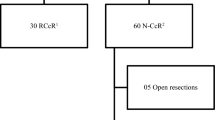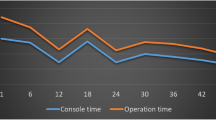Abstract
Robotic surgery enhances the precision of minimally invasive surgery through improved three-dimensional views and articulated instruments. There has been increasing interest in adopting this technology to colorectal surgery and this has recently been introduced to the Irish health system. This paper gives an account of our early institutional experience with adoption of robotic colorectal surgery using structured training. Analysis was conducted of a prospectively maintained database of our first 55 consecutive robotic colorectal cases, performed by four colorectal surgeons, each at the beginning of his robotic surgery experience, using the Da Vinci Si® system and undergoing training as per the European Academy of Robotic Colorectal Surgery (EARCS) programme. Overall surgical and oncological outcomes were interrogated. Fifty-five patients underwent robotic surgery between January 2017 and January 2018, M:F 34:21, median age (range) 60 (35–87) years. Thirty-three patients had colorectal cancer and 22 had benign pathologies. Eleven rectal cancer patients had neoadjuvant chemoradiotherapy. BMI was > 30 in 21.8% of patients and 56.4% of patients had previous abdominal surgery. Operative procedures performed were low anterior resection (n = 19), sigmoid colectomy (n = 9), right colectomy (n = 22), ventral mesh rectopexy (n = 3), abdominoperineal resection (n = 1) and reversal of Hartmann’s procedure (n = 1). Median blood loss was 40 ml (range 0–400). Mean operative time (minutes) was 233 (SD 79) for right colectomy and 368 (SD 105) for anterior resection. Median length of hospital stay was 6 days (IQR 5–7). There was no 30-day mortality, intraoperative complications, conversion to laparoscopic or open, or anastomotic leakage. Median lymph nodes harvest was 15 in non-neoadjuvant cases (range 7–23) and 8 in neoadjuvant cases (2–14). Our early results demonstrate that colorectal robotic surgery can be adopted safely for both benign and neoplastic conditions using a structured training programme without compromising clinical or oncological outcomes. The early learning curve can be time intensive.
Similar content being viewed by others
References
Fleshman J, Sargent DJ, Green E et al (2007) Laparoscopic colectomy for cancer is not inferior to open surgery based on 5-year data from the COST Study Group trial. Ann Surg 246:655–664. https://doi.org/10.1097/SLA.0b013e318155a762
Colon Cancer Laparoscopic or Open Resection Study Group, Buunen M, Veldkamp R et al (2009) Survival after laparoscopic surgery versus open surgery for colon cancer: long-term outcome of a randomised clinical trial. Lancet Oncol 10:44–52. https://doi.org/10.1016/S1470-2045(08)70310-3
Nelson H, Sargent DJ, Wieand HS et al (2004) A comparison of laparoscopically assisted and open colectomy for colon cancer. N Engl J Med 350:2050–2059
Abraham NS, Young JM, Solomon MJ (2004) Meta-analysis of short-term outcomes after laparoscopic resection for colorectal cancer. Br J Surg 91:1111–1124
EH A (2009) Laparoscopic colorectal surgery: summary of the current evidence. Ann R Coll Surg Engl 91:541–544
Stephen M. Kavic SMK (2002) Adhesions and adhesiolysis: the role of laparoscopy. JSLS 66:99–109
Moran DC, Kavanagh DO, Nugent E et al (2011) Laparoscopic resection for low rectal cancer: evaluation of oncological efficacy. Int J Colorectal Dis 26:1143–1149. https://doi.org/10.1007/s00384-011-1221-9
Ohtani H, Tamamori Y, Arimoto Y et al (2012) A meta-analysis of the short- and long-term results of randomized controlled trials that compared laparoscopy-assisted and open colectomy for colon cancer. J Cancer 3:49–57. https://doi.org/10.7150/jca.3621
Tjandra JJCMK (2006) Systematic review on the short-term outcome of laparoscopic resection for colon and recto-sigmoid cancer. Color Dis 8:375–388
Maggiori LPY (2013) Is it time for a paradigm shift: laparoscopy is now the best approach for rectal cancer? Transl Gastrointest Cancer 3(1):1–3
Good DW, O’Riordan JM, Moran D et al (2011) Laparoscopic surgery for rectal cancer: a single-centre experience of 120 cases. Int J Color Dis 26:1309–1315. https://doi.org/10.1007/s00384-011-1261-1
Abu Gazala M, Wexner SD (2017) Re-appraisal and consideration of minimally invasive surgery in colorectal cancer. Gastroenterol Rep 5:1–10. https://doi.org/10.1093/gastro/gox001
Lee SW (2009) Laparoscopic procedures for colon and rectal cancer surgery. Clin Colon Rectal Surg 22:218–224. https://doi.org/10.1055/s-0029-1242461
Shearer R, Aly OE, Aly EHGM (2013) Have early post-operative complications from laparoscopic rectal cancer surgery improved over the past 20 years? Color Dis 15:1211–1226
Cecil TD, Taffinder N, Gudgeon AM (2006) A personal view on laparoscopic rectal cancer surgery. Color Dis 8:30–32
Delaney CP, Lynch AC, Senagore AJ, Fazio VW (2003) Comparison of robotically performed and traditional laparoscopic colorectal surgery. Dis Colon Rectum 46:1633–1639
Ballantyne GHMF (2003) The da Vinci telerobotic surgical system: the virtual operative field and telepresence surgery. Surg Clin N Am 83:1293–1304
SH B (2008) Robotic colorectal surgery. Yonsei Med J 49:891–896
Weber PA, Merola S, Wasielewski A et al (2002) Telerobotic-assisted laparoscopic right and sigmoid colectomies for benign disease. Dis Colon Rectum 45:1686–1695
EARCS Training curriculum for robotic colon and rectal surgery. https://earcs.pt/index.php/curriculum. Accessed Apr 2018
Al Asari S, Min BS (2012) Robotic colorectal surgery: a systematic review. Surgery. https://doi.org/10.5402/2012/293894
Rawlings AL, Woodland JH, Crawford DL (2006) Telerobotic surgery for right and sigmoid colectomies: 30 consecutive cases. Surg Endosc 20:1713–1718
Kariv Y, Delaney CP (2005) Robotics in colorectal surgery. Minerva Chir 60:401–416
Giulianotti PC, Coratti A, Angelini M et al (2003) Robotics in general surgery: personal experience in a large community hospital. Arch Surg 138:777–784
Baik SH, Kwon HY, Kim JS et al (2009) Robotic versus laparoscopic low anterior resection of rectal cancer: short-term outcome of a prospective comparative study. Ann Surg Oncol 16:1480–1487
Xu H, Li J, Sun Y et al (2014) Robotic versus laparoscopic right colectomy: a meta-analysis. World J Surg Oncol 12:274. https://doi.org/10.1186/1477-7819-12-274
Sun Y, Xu H, Li Z, Han J, Song W, Wang J, Xu Z (2016) Robotic versus laparoscopic low anterior resection for rectal cancer: a meta-analysis. World J Surg Oncol 14:61
Fielding GA, Lumley J, Nathanson L et al (1997) Laparoscopic colectomy. Surg Endosc 11:745–749. https://doi.org/10.1007/s004649900441
Sunu PV, Mittal NJ (2017) Outcomes after laparoscopic or robotic colectomy and open colectomy when compared by operative duration for the procedure. Am J Surg 215(4):577–580. https://doi.org/10.1016/j.amjsurg.2017.04.020
Van der Pas MH, Haglind E, Cuesta MA et al (2013) Laparoscopic versus open surgery for rectal cancer (COLOR II): short-term outcomes of a randomised, phase 3 trial. Lancet Oncol 14:210–218
Author information
Authors and Affiliations
Corresponding author
Ethics declarations
Conflict of interest
Mohammed Aradaib, Paul Neary, Adnan Hafeez, Reza Kalbassi and Diarmuid O’Riordain declare that they have no conflict of interest. Professor Amjad Parvaiz is a proctor for the European Academy of Robotic Colorectal Surgery which is funded by Intuitive Surgical.
Rights and permissions
About this article
Cite this article
Aradaib, M., Neary, P., Hafeez, A. et al. Safe adoption of robotic colorectal surgery using structured training: early Irish experience. J Robotic Surg 13, 657–662 (2019). https://doi.org/10.1007/s11701-018-00911-0
Received:
Accepted:
Published:
Issue Date:
DOI: https://doi.org/10.1007/s11701-018-00911-0




